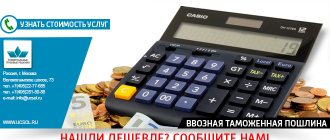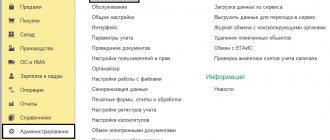From this article you will learn:
- Ban on the purchase of imported equipment under 44-FZ
- Cases in which the ban on the purchase of imported equipment does not apply
- Restrictions on the purchase of imported equipment
- The procedure for obtaining permission to purchase imported equipment under 44-FZ
- 3 frequently asked questions about the purchase of imported equipment under 44-FZ
The purchase of imported equipment under 44-FZ is closely related to the provisions of the law prescribed in Article 14. It talks about the prohibition and restrictions in force on procurement procedures, as well as the conditions for allowing equipment manufactured abroad to participate in tenders.
In this matter, it is important to know about the latest changes to 44-FZ, which have come into force, the correct registration of admission and what kind of imported equipment cannot, under any circumstances, participate in the auction. There are many nuances, but they are easy to understand.
Ban on the purchase of imported equipment under 44-FZ
The law prohibits:
- purchase of imported goods (products of manufacturers of EAEU member countries are not included here) included in the lists for their needs by state and municipal institutions;
- purchase of imported goods (products of manufacturers of EAEU member countries are also an exception), including those included in the lists, performance of work (services) by citizens of other states (except for the countries of the Eurasian Economic Union), if the contract is concluded for the purpose of ensuring the security and defense of Russia.
The purchase of imported equipment under 44-FZ is regulated by Article 14 of this law, as well as other regulatory documents issued by the Russian Government. In general, the contract system establishes a ban on the purchase of certain items of imported goods, as well as works and services performed by entities of other states.
Below is a list of regulations that regulate the national treatment in the contract system and prohibit the admission to trading of goods of foreign origin:
- Mechanical engineering - Decree No. 656 of July 14, 2014.
- Software - Decree No. 1236 of November 16, 2015.
- Hardware and software systems for data storage systems - Government Decree No. 1746 of December 27, 2019.
- Industrial products - Government Decree No. 616 of 04/30/2020.
Thus, if the procurement object is subject to the above regulations, then the customer cannot accept the application if the participant offers imported goods. This norm does not apply to products from EAEU member countries (Russia, Belarus, Armenia, Kyrgyzstan, Kazakhstan).
Which documents in the 1C program reflect these operations?
| Export | 1. Document “Sales of goods” with a VAT rate of 0%, the total amount of the document must be equal to the amount of the customs declaration on line 22; 2. Based on the “Sales of goods”, a document “Customs declaration (export)” is created, which indicates the VAT transaction code, mode of transport, and accompanying document; 3. Customs duties are written off using the document “Accounting Certificate”. |
| Import | 1. Document “Receipt of goods”, in which the total amount of all documents must be equal to the amount according to the customs declaration, line 22; 2. Based on the “Receipt of Goods”, a document “Customs Declaration (Import)” is created, which reflects the amounts of customs duty, customs duty, customs VAT and customs value. Please note that the customs value may include transport costs to the border in accordance with the terms of delivery according to Incoterms 2010 If goods are imported from member states of the EAEU on the basis of the “Receipt of Goods” document, a document “Application for the Import of Goods” is created. |
Cases in which the ban on the purchase of imported equipment does not apply
What should a customer do if he needs to purchase imported equipment under 44-FZ, since there are no domestic analogues? The law provides for the following circumstances when the prohibition does not apply:
- The product the customer needs is not produced in Russia. This fact must be confirmed:
- If the procurement object is included in the list, then it is necessary to obtain a permit to purchase imported industrial goods. This is done in accordance with the rules developed by the Ministry of Industry and Trade of the Russian Federation through the functionality of the state industrial information system;
- if the procurement is carried out with the aim of ensuring the defense and security of the state and the object is not included in the list or works (services) performed by foreign entities are purchased, then the customer makes the justification independently;
- the procurement object is a single product with a price of no more than 100 thousand rubles or a batch of such goods worth up to 1 million rubles. (exceptions include goods from the list in positions 1–7, 124 and 125);
- it is required to ensure the compatibility of the purchased equipment with the customer’s existing equipment (exceptions are goods from the list of items 67–71);
- spare parts and consumables are purchased for equipment in use by the customer, for which it is necessary to comply with the requirements of technical documentation (for goods from the list of items 47–51);
- the customer is one of the following entities: Federal Security Service of the Russian Federation, Federal Security Service of the Russian Federation, Foreign Intelligence Service of the Russian Federation, foreign intelligence agency of the Ministry of Defense of the Russian Federation, Ministry of Internal Affairs of the Russian Federation, Federal Service of the National Guard Troops of the Russian Federation, Administration of the President Russian Federation, Main Directorate of Special Programs of the President of the Russian Federation (an exception is made when purchasing goods specified in paragraphs 1–7, 52–57, 73–75, 81 of the list; when purchasing one unit of goods specified in paragraphs 47–51 of the list, if its price does not exceed 2 million rubles);
- the customer is the Federal Security Service of the Russian Federation, which carries out procurement for the purposes of state security; acquisition by the Ministry of Internal Affairs of the Russian Federation of vehicles to ensure the security of state security facilities.
The prohibitions for admission to trading for imported products apply not only to the procurement items themselves, but also to those goods that are supplied during the performance of work or services. The same provision applies to rental and leasing objects.
Conversion into rubles
The obligation to a foreign supplier is recalculated into rubles at the official exchange rate of the Central Bank of the Russian Federation on the date of acceptance of the goods for accounting, on the last day of the current month and on the date of payment. If the exchange rate increases, negative exchange rate differences arise, which are taken into account as part of non-operating expenses (subclause 5, clause 1, article 265, subclause 6, clause 7, clause 10, article 272 of the Tax Code of the Russian Federation). If the exchange rate decreases, then positive exchange rate differences arise, which are taken into account as part of non-operating income (clause 11, part 2, article 250, subclause 7, clause 4, clause 8, article 271 of the Tax Code of the Russian Federation).
Restrictions on the purchase of imported equipment
The application of the national regime in the field of public procurement involves the functioning in parallel of two mechanisms - prohibition and restrictions. In relation to the latter, certain conditions are established when customers have the right to purchase goods with limited access. Therefore, the procurement initiator is obliged to take into account all these standards. Products subject to restrictions:
- medicines;
- medical products;
- radio electronics;
- Food;
- manufactured goods.
Restrictions on the purchase of imported goods do not apply in the following cases:
- the procurement procedure is carried out before the application of restrictions under the law;
- the purchase is carried out on the territory of a foreign state for the own needs of the customer whose activities are carried out in this country.
Restrictions on the purchase of radio electronics. Legislators establish restrictions on the purchase of imported equipment under 44-FZ, provided that it is included in the list from the RF PP No. 878 dated July 10, 2019. The restrictions are valid until 09/01/2021 (clause 13 of the Russian Federation Regulations No. 878).
The essence of restrictive measures when purchasing radio-electronic goods is as follows:
- Commodity items from the list can only be purchased separately; it is prohibited to combine these items within one transaction or lot (clause 7 of RF Regulation No. 878).
- The calculation of the initial (maximum) contract price and its justification must be carried out in accordance with the methodological recommendations of the Ministry of Industry and Trade of the Russian Federation. This rule does not apply if the purchase falls within the scope of state defense procurement (clause 6 of the RF PP No. 878). The requirement applies not only to the NMCC, but also to the initial price of a unit of goods, the initial amount of prices and the maximum value of the contract value. Justification for any price category is carried out in accordance with the requirements of Part 24 of Art. 22 44-FZ.
- The potential supplier confirms the country of origin of the product and its compliance with the conditions of the national regime with a declaration, which must indicate that the specific product is included in the Unified Register of Russian Radio-Electronic Products under a certain number (clause 3 of PP No. 878). Customers should establish this requirement in the tender documentation and notice.
- If at least two applications are submitted to the tender offering a product that fully meets the customer’s requirements and is included in the Unified Register of Russian Radio-Electronic Products, then applications with imported goods are not allowed to participate in the auction - the “third wheel” rule (clause 3 of PP No. 878). But at the same time, accepted applications should not contain products with the same characteristics and the same brand. If the procurement organizer allows imported goods to be auctioned, then national treatment restrictions must be applied to them.
- If the contract is signed and the contractor undertakes to supply domestic products from the register, then it is impossible to subsequently replace them with imported ones (part 7 of article 95 44-FZ, clause 8 of PP No. 878).
Features of customs clearance
Equipment and machines can be imported by individuals and legal entities. In the first case, customs clearance is as simplified as possible, but the batch must be of non-commercial size. Customs duty is not paid on cargo weighing less than 25 kg and costing less than 500 euros. Otherwise, it is calculated at 30% of the excess amount or 4 euros for each kg over the norm. In this case, customs may require receipts and explanations of where the goods were purchased and for what purposes.
ATTENTION! We work only with legal entities.
For legal entities, the customs clearance procedure takes place as standard. They can import equipment and machines in order to improve their own production and for sale. In this case, customs duties are required to be paid, calculated depending on the classification code of the Commodity Nomenclature of Foreign Economic Activity. The duty rate varies from 0 to 10%, VAT is 20%. The duty is charged for each kilogram of cargo.
The procedure for obtaining permission to purchase imported equipment under 44-FZ
The restriction on the purchase of imported goods by budgetary organizations, established in 44-FZ, implements state policy to support domestic producers. The law obliges the customer to give preference to Russian goods in pursuance of the import substitution program. Since May 2021, significant changes have occurred in the procedure for admitting foreign goods, works and services to trading.
Order No. 1755 of the Ministry of Industry and Trade dated May 29, 2021 sets out the procedure for obtaining permission to purchase foreign products, which the customer can obtain by submitting the appropriate application.
The table provides a brief overview of the permitting process.
| Who should apply for a permit | The application is submitted:
An authorized person acts on behalf of the customer, signs the application and submits it. |
| Application Mechanism | The application is completed and submitted in your personal account on the website of the State Industry Information System (GISP) through its functionality. Filling out the application form is entrusted to the authorized representative of the customer, who also signs the document with an enhanced qualified electronic signature. The application and accompanying documents must not contain classified information. In the case of purchasing several product items, each of them has its own application, accompanied by a package of documents. As the application progresses and is considered, information about each stage is sent to the GISP personal account, and messages are simultaneously sent by email. |
| Contents of the application | What information the application must contain is stated in paragraph 3 of the procedure for obtaining permission. Namely:
|
| Application verification procedure | The application is verified in several stages. First of all, within 5 working days from the date of receipt of the document, specialists from the Department of the Ministry of Industry and Trade examine whether all the information is indicated and how correct it is. If errors or inconsistencies are identified, the application will be returned for revision. If no shortcomings are identified in this part of the application, it is subject to comparative analysis. This is done by the GISP system automatically: information about the product in the application is checked with similar positions in the registers of Russian and Eurasian products. |
| Time for consideration of an application and issuance of a permit | If the system does not find an analogue of the product in the registers, then the permit is issued within 5 working days. If there are entries in the registers about similar products, then the GISP sends a request to its manufacturer, which clarifies the possibility of manufacturing the specified product. After receiving this request, the manufacturer must post a response, positive or negative, on the GISP website within 10 working days. In the absence of information from the manufacturer, it is considered that there is no analogue. If there is a response from the manufacturer within 5 working days, the customer is sent:
If the customer does not agree with the refusal, he has the right to challenge the decision. |
| Special conditions of purchase | The permit is issued for a period of 18 months and only for one purchase. If the permit is used and a contract is concluded, then within 10 working days after this the customer must report to the GISP personal account on the results of the purchase. |
Equipment certification schemes
To select a certification scheme, you must be guided by the Decision of the EEC Council No. 44 of April 18, 2021 “On standard conformity assessment schemes.”
1c certification scheme
used for mass-produced products.
Certification scheme 2c
applied to mass-produced products if the manufacturer has an implemented management system certified by a management systems certification body.
3c certification scheme
applied to a batch of products.
4c certification scheme
applied to a single product if the research (tests) and measurements for this product are not destructive.
5c certification scheme
is used for serially produced products in the event that it is completely impossible or difficult to confirm compliance with the requirements of technical regulations when conducting research (tests) and measurements of finished products.
6c certification scheme
is used for serially produced products if it is completely impossible or difficult to confirm compliance with the requirements of technical regulations when conducting research (tests) and measurements of finished products, as well as if the manufacturer has an implemented management system certified by a management systems certification body.
7c certification scheme
is used for products intended for mass production, in case of planning the release of product modifications.
8c certification scheme
applies to products intended for mass production, in the case of planning the release of product modifications and if the manufacturer has an implemented management system certified by a management systems certification body.
9c certification scheme
applies to single products intended to equip enterprises in the customs territory of the Union.
Standard equipment declaration schemes
Declaration of conformity scheme 1d
applies to serially produced products when declaring conformity based on the applicant’s own evidence.
2D declaration of conformity scheme
applied to a batch of products or a single product when declaring conformity based on the applicant’s own evidence.
3D declaration of conformity scheme
applied to mass-produced products when declaring conformity on the basis of evidence obtained with the participation of an accredited testing laboratory (center) and the applicant’s own evidence (if available).
4D declaration of conformity scheme
applied to a batch of products or a single product when declaring conformity on the basis of evidence obtained with the participation of an accredited testing laboratory (center) and the applicant’s own evidence (if available).
Declaration of conformity scheme 5d
is used for products intended for mass production, in case of planning the release of product modifications.
Declaration of conformity scheme 6d
applied to mass-produced products if the manufacturer has an implemented management system certified by a management systems certification body.
Declaration of equipment
Declaration of conformity is a mandatory document confirming the safety of equipment. The declaration and the mandatory certificate have equal legal force. This means that for equipment specified in the lists of products subject to declaration, registration of a declaration of conformity is mandatory. The manufacturer (may also be the seller) accepts the declaration, i.e. takes responsibility for the conformity of products.
Technical regulations of the Customs Union also contain lists of equipment subject to declaration of conformity. The GOST R system defines a list of technical devices (Resolution of the Government of the Russian Federation of December 1, 2009 No. 982), for which it is mandatory to register a declaration.
The declarant may rely on his own materials confirming safety, but in appropriate cases, the equipment must be subjected to an independent assessment by accredited testing laboratories (centers).
The certification body registers the completed declaration after analyzing all provided documents that confirm compliance with safety requirements for the design, use, storage, transportation, and disposal of manufactured equipment.








